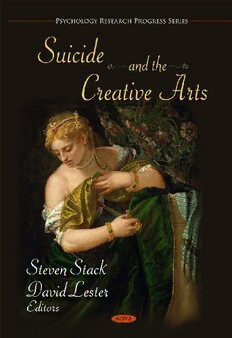
Suicide and the Creative Arts (Psychology Research Progress Series) PDF
340 Pages·2009·4.522 MB·English
Most books are stored in the elastic cloud where traffic is expensive. For this reason, we have a limit on daily download.
Preview Suicide and the Creative Arts (Psychology Research Progress Series)
Description:
Artistic work itself has been thought of as a life-saving behavior for some suicidal artists. Artistic depictions of suicide can also have a contagion effect, causing suicides among members of the real-world audience. Guidelines are still needed for institutions such as the motion picture industry for minimizing possible copycat effects of suicides in feature films and other artistic displays of suicide. Perhaps one of the most important reasons for studying suicide art is for insights into the motives for suicide. Artists portrayed many motives for suicide long before the rise of the science of suicidology in the 20th Century. Motives including social factors such as death of a loved one, honour, economic strain, and betrayal in love have roots in many historical artistic products. Sophocles' plays, dating from 2,500 years ago, contain several motives that are still found today. The history of suicide in art, especially if film is included, may be subject to continuities as well as changes in the motives for suicide. While the visual arts may have drifted away from certain causes of suicide, such as heroism, these causes may actually live on in other art forms including film and opera. The present volume stresses a holistic approach to the study of suicide in art. Patterns in one art venue may be both similar and different to those in other venues. Hence, caution needs to be exercised in making generalizations on the basis of one or a few modalities of artistic creations.
See more
The list of books you might like
Most books are stored in the elastic cloud where traffic is expensive. For this reason, we have a limit on daily download.
